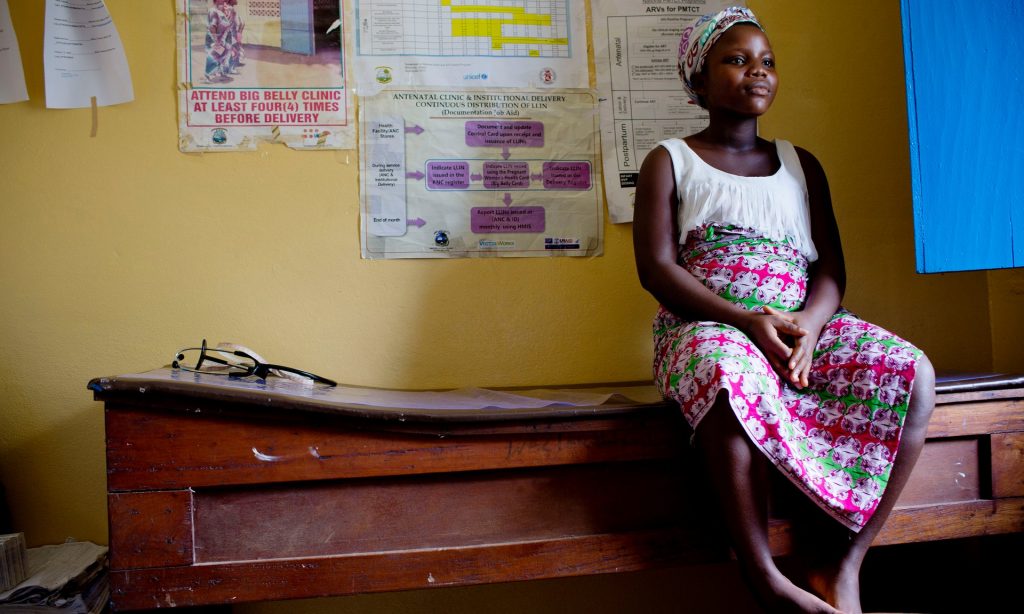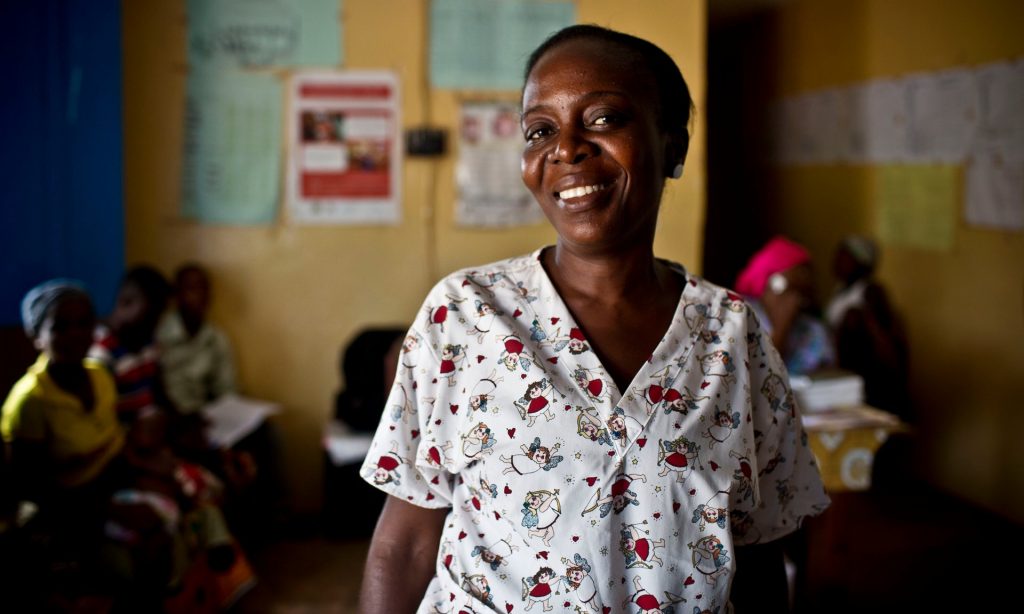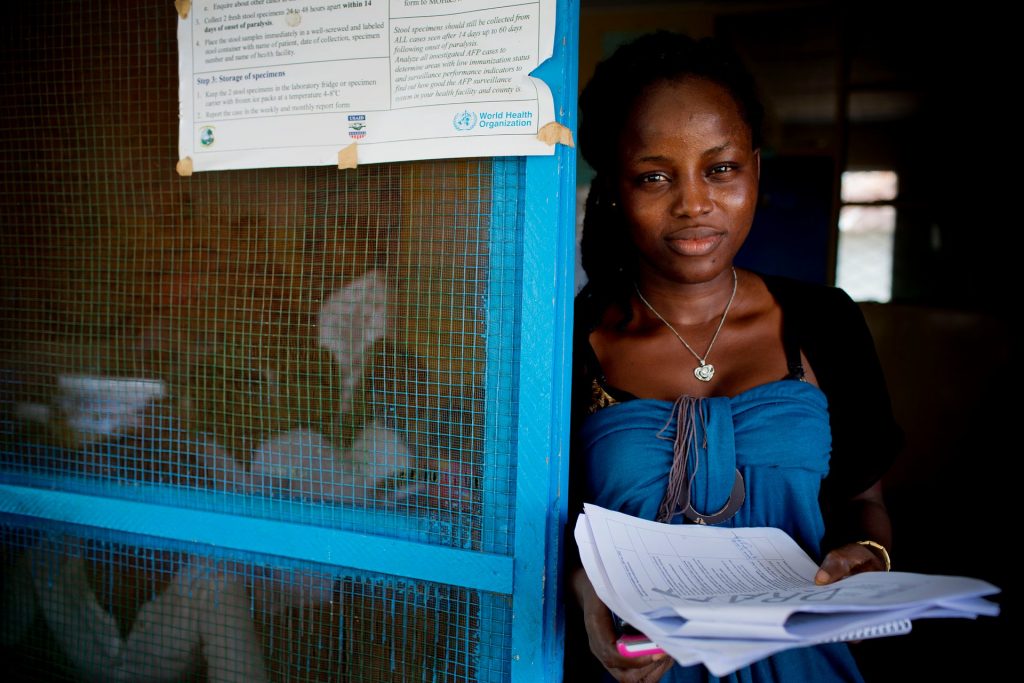
The Well Baby clinic in Buchanan is busy. But that’s not unusual. The clinic, a two-hour drive from Liberia’s capital, Monrovia, sees between 700 and 1,000 mothers and children each week.
Nurse Cellian Fahncole sits in a consulting room off the main waiting room. She is examining a baby girl and asking the mother a series of questions, checking the responses against a list. “I am asking, ‘Does the child have fever and for how long? Is the fever accompanied by other symptoms?’ I refer to my book and check for danger signs, which are highlighted in pink. If there is any one of the danger signs, I know that I need to refer the child to a hospital,” she says.
Fahncole is using a system of diagnosis in which midwives and nurses in 77 health facilities across three counties were recently trained.
“The mother said the child was coughing so I did a breath count on the child, measuring how many breaths per minute, but the breath count did not fall into the pink zone on my check list so I know that was not serious.

“The same with diarrhoea. She had it but it wasn’t threatening her life. I asked, ‘Is she drinking normally? Is she thirsty all the time?’ If it showed symptoms of dehydration, then I go to that column and explore that aspect in more detail. But she didn’t have more than two of the signs, so I was able to rule it out. It helps me know I am making good decisions.”
The system is being introduced by the international health organisation Jhpiego, which has supported the mother and baby clinic since the Ebola crisis.
Jhpiego, an affiliate of Johns Hopkins University in Maryland, US, provided training on how to use protective equipment for staff during the Ebola epidemic. It now offers wider medical staff training and, crucially, the introduction of standardised systems of care designed to better spot and treat illnesses.
The new system is part of a global push to better manage childhood illness.
“It was difficult for our government to standardise healthcare; they do not have the resources. The best thing that Jhpiego has done here, aside from giving us protective kit during Ebola, is training us. I feel now that we have the best knowledge to help people. We really didn’t have that before,” says Fahncole.

The training is really helping nurses, says Satto Johnson, a county health officer. Until recently she worked as a nurse in a government-run hospital that faced huge difficulties providing care where there is a chronic lack of equipment and expertise.
Johnson adds: “Once I had three patients needing oxygen and only one oxygen tank, so I kept having to move it between the three of them. That kind of thing is really tough when all you want to do is help people but you can’t. At the hospital only the bosses used to get any training, never the nurses. But now every level of worker gets it. It has really helped us to stay on top.”
Babygryl is at the clinic with her daughter Ellis for vaccinations. It cost her 25 Liberian dollars (about 20p) and took two hours to get here by motorbike taxi. When she arrived she asked for paracetamol because Ellis had a fever. Normally, the fever would have prevented staff from vaccinating her. But rather than letting her go, nurses have kept her at the clinic all day, regularly bathing her in a bid to bring down her fever.
“It’s not ideal,” explains a nurse. “But if we let her go she probably won’t come back so we want to see if we can bring down the child’s temperature enough to safely vaccinate her. I am also a little concerned about the mother’s health. When I was talking to her I could see she sounded a little depressed, so we want to assess her too.”
The clinic is streamlining its services for women. In the past if a woman came to have a baby vaccinated, she would be told to come back on another day if she also needed family planning. Attempts are now being made to identify and serve all a woman’s needs in one visit.
Jamyah, 17, came to the clinic for antenatal care but was also offered family planning advice by a specialist worker. She says she didn’t know about family planning “so it is good to learn this today”.
Stephen E James, the local director for community health, says he’s confident that standardised systems could be key to helping Liberia withstand another Ebola outbreak.
“Before, we didn’t do enough prevention control or case management of individual patients. But now, if you take this clinic as just one example, you can see the changes. Where once only senior level staff had proper training, now it has cascaded to all healthcare workers.”
Fahncole diagnoses the baby girl with non-life threatening malaria and she is allowed to go home. But as she points out, there is still a long way to go when it comes to improving the health of the nation.
“Malaria is one the biggest killers of children here. Many families have no roofs on their houses so they have no way to protect themselves from malaria. When it rains they have to sleep in the wet, then they get pneumonia. We still have no way to stop poverty making people sick.”

